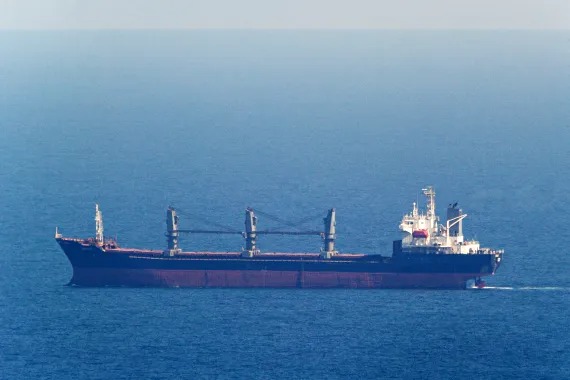The United Kingdom has issued a stark warning about Russia’s potential use of ‘sea mines’ to disrupt civilian shipping in the Black Sea. This ominous revelation comes on the heels of Ukraine’s announcement that 12 cargo vessels stand ready to traverse a newly established Black Sea shipping corridor, defying a de facto Russian blockade. The UK Foreign Office, relying on intelligence sources, has raised concerns that Russia may resort to laying sea mines to hinder ships passing through a humanitarian corridor created by Ukraine for grain exports from its Black Sea ports.
Rising Maritime Tensions in the Black Sea
The Black Sea, once a serene stretch of water, has become a cauldron of rising tensions as Russia continues to flex its military muscle. Moscow’s decision to withdraw from an agreement in July, which had hitherto allowed Ukraine to safely transport food products through the Black Sea, has aggravated the situation. This agreement was traditionally Ukraine’s primary export route for grain. Subsequently, Russia declared that vessels near Ukraine’s Black Sea ports could be seen as supporters of Kyiv’s conflict efforts, further escalating hostilities.
The Perilous Humanitarian Corridor
As Russia escalated aerial attacks on Ukraine’s ports using drones and missiles, significant damage has been inflicted on critical infrastructure, with almost 300,000 tonnes of grain destroyed. This devastating impact threatens the food security of over one million people for an entire year. In response, Ukraine established a temporary ‘humanitarian corridor’ in the Black Sea, allowing cargo vessels to take the risk of sailing to its ports. Over 20 ships are now preparing to enter and exit Ukraine’s sea ports, with a total of 12 vessels set to enter the new corridor.
International Concern and Alliances
The world is closely monitoring developments in the Black Sea, with the UK’s Foreign Secretary, James Cleverly, emphasizing that “the world is watching” Russia’s actions. Concerns are mounting that Russia might falsely attribute attacks on civilian vessels to Ukraine, creating a volatile situation. Ukraine, determined to safeguard civilian ships in its territorial waters, has received support from NATO member countries, including Romania, Bulgaria, and Turkey, as vessels venture into these international waters.
Kyiv’s efforts to increase exports through alternative routes, such as the Danube River to Romania and onwards by road to international markets, signify its resilience in the face of adversity. Nevertheless, the Black Sea remains a crucible of tensions, with recent satellite imagery indicating Russia’s transfer of 10 vessels from Sevastopol to Novorossiysk in response to escalating conflicts around the Crimean Peninsula.
Last month, the UK accused Russia of attempting to attack a civilian cargo ship at a Black Sea port in August, an incident that was reportedly thwarted by Ukrainian air defense systems. The UK, in partnership with Kyiv and other allies, is actively working to enhance the safety of Ukrainian shipping. Intelligence, surveillance, and reconnaissance capabilities are being deployed to monitor Russian activities in the Black Sea, signaling a concerted effort to defuse the brewing maritime crisis.
















